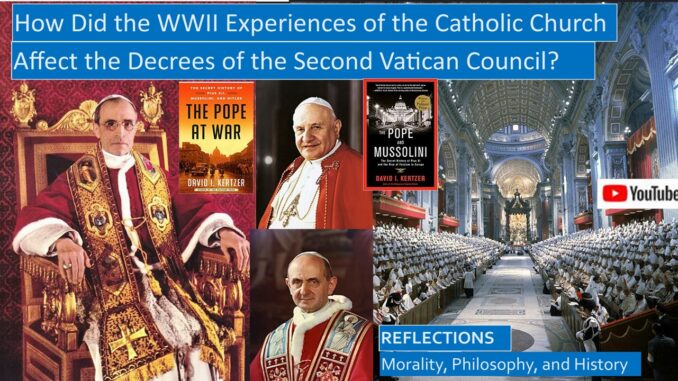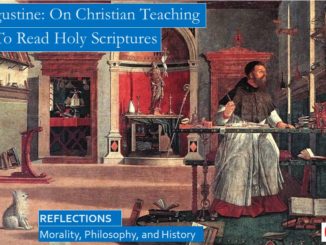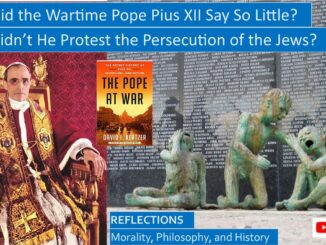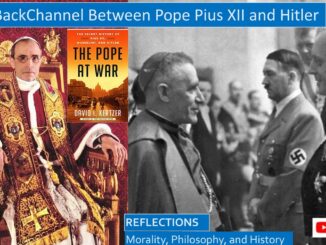
The memories of World War II are key to understanding the teachings of Vatican II and the Catholic Catechism. During the war years there were many brave bishops in Germany and France, and the Pope, who took public and private stands pushing back on the horrors of the Holocaust and Nazi brutalities. However, the attitudes of the clergy reflect the attitudes of the political culture in general, most supported the political status quo, many lived quiet lives of passive resistance, a precious minority actively resisted the horrors of Nazi terror.
In contrast, in the early interwar years most Christians were tolerant of fascist regimes because the fascists were the sworn enemies of communism, and communism was the sworn enemy of the church. After Lenin seized power in Soviet Russia, his communists murdered millions of Orthodox believers and priests. Likewise, the communists in the Spanish Civil War copied the Russian communists by torturing and murdering thousands of priests, monks and nuns.
In spite of the utter defeat of Nazi Germany and fascist Italy in World War II, many Europeans remained sympathetic to the fascist ideology. The defeat of the Axis powers and the publicity about the concentration camps may have discredited anti-Semitism, but it did not totally destroy such evil in the hearts of men. Few traditional Catholic priest or bishops were anti-Semites, but the few that were anti-Semites were all “traditional” Catholics.
Script for this video, with more Amazon book links: https://www.slideshare.net/BruceStrom1/how-did-the-experiences-of-world-war-ii-influence-the-second-vatican-council
This YouTube Video: https://youtu.be/QQEd9LDzV1U
Contrary to the impressions of many, Vatican II did not introduce any theological reforms, Vatican II sought to share with the world the theology of the original reform council, the Council of Trent. What Vatican II changed was the political philosophy of the Catholic Church.
LESSON: DEMOCRACY IS THE TRUE FRIEND OF THE CHURCH
Vatican II marks a shift in the Church’s attitude towards the modern secular world. Gone are the anathemas of the Council of Trent and many other councils that condemn those who may disagree with the teachings of the church, instead Vatican II seeks dialogue with the modern world in with a pastoral rather than a condemning attitude. The Vatican II decree on religious freedom announced that democracy and freedom of religion and conscience were the friends of the church, that a totalitarian form of government could never be a trustworthy friend of the Catholic or Christian Church.
The Church Fathers of Vatican II believed that the Catholic guarantee of Religious Liberty was crucial for regaining the respect of many believers and the modern world. History had evolved so that the Catholic Church was not on the side of truth regarding religious liberty. From ancient times the Catholic Church was supported first by the Roman emperors starting with Constantine, and then the royalty of medieval Europe, but the absolute monarchies had all disappeared, giving way to dictators and republics, some of which were constitutional monarchies.
The Jacobism of the French Revolution and its grandchild communism were the enemies of the church, and the church supported fascism to combat communism. World War II totally discredited fascism, now the Catholic Church saw democracy as the bulwark opposing communism and fascism, and religious liberty was a cornerstone for democracy. The Post-Vatican II Catholic Church no longer associated democracy with the excesses of the French Revolution.
The Vatican II Declaration on Religious Freedom, or Dignitatis Humanae, teaches us that just governments should not only reluctantly tolerate religious freedom, but should rather seek to encourage a healthy civil environment in which religious worship and institutions can thrive, encouraging the religious and the whole society to live a more moral life.
LESSON: THE CHURCH MUST KEEP AN OPEN DIALOGUE WITH ALL POLITICAL PARTIES IN A DEMOCRACY
The Catholic Church remembered how the Vatican spurned the Catholic Center Parties, first in Italy when Mussolini gained power, then a decade later when Hitler needed Catholic support to pass the Enabling Act declaring him as the absolute Fuhrer over Germany. With this history in mind, in the spirit of Vatican II, we should recognize that a striving democracy is essential to guarantee that the Church can fulfill its mission, and that believers should never demonize any political party simply because the church does not agree with all of their positions. We should especially not demonize a political party that enthusiastically champions the doctrine of social justice that is central to so many papal decrees and encyclicals since Rerum Novarum was issued by Pope Leo XIII in 1891. This decree explored the proper relationships between capital and labor, the government and her citizens, and addressed the need for humane living and working conditions for the working class.
WARTIME EXPERIENCES, LEADERS OF VATICAN II
We reviewed the role of the Vatican II leaders in David Kertzer’s two books, The Pope and Mussolini, concentrating on the pontificate of Pope Pius XI, and The Pope At War, on Pope Pius XII.
The two Vatican II popes, John XXIII and Paul VI, both had histories of resisting Nazism and fascism. We distinguish between these similar totalitarian ideologies because Nazism is an extreme fascist movement that is violently anti-Semitic, while Spanish Franco fascism and pr-1938 Italian Mussolini fascism were not blatantly anti-Semitic.
The two major popes after Pope Paul VI were leading theologians in the Second Vatican Council, all had wartime experiences that influenced their worldview. Pope Francis is the first post-Vatican II pope.
Their positions were influenced by their wartime experiences, which include:
- Rejection of anti-Semitism and forced baptism of Jews.
- Rejection of the long-standing view that Jews were responsible for deicide, the crucifixion of Christ.
- Embrace of religious liberty, influenced by the American experience.
- Realization that totalitarian governments are the long-term enemy of the church, though they may be a short-term false friend of the church.
- Realization that genuine democracy is the long-term friend of the church, though in the short-term they it may be secular and skeptical of the church and her teachings.
When Archbishop Angelo Roncalli, the future Pope John XXIII, reflected on Yves Congar’s book, True and False Reform of the Church, intently writing notes in the margin, he asked, “A reform of the church? Is such a thing really possible?” When he decided to throw open the windows of the Catholic Church to the modern world by calling the Second Vatican Council, he did so not to denounce errors, but to engage the world in a pastoral and loving manner, mirroring much of what Yves Congar said in this book.
https://youtu.be/yYp7yFZqc3s and https://youtu.be/1xqY0kN1eKk and https://youtu.be/ALZozpbSrM4
Early in his career as a priest, Roncalli’s sermons criticized the Italian fascist regime Italy; some scholars believe that was part of the reason why he was promoted to the diplomatic corps to represent the Vatican in Orthodox Bulgaria. He later was also appointed Apostolic Delegate to Turkey and Greece and ordained as archbishop of Bulgaria, he was fortunate that he was both sufficiently removed from the Nazi powers to avoid persecution, while being close enough to the conflict to truly help what Jews he could. Roncalli’s close relationship with Franz von Papen, German ambassador to Turkey, helped save the lives of tens of thousands of Jews, Dr Wikipedia lists how these Jews were saved.
Roncalli’s many experiences with the Jewish, Orthodox, Muslim, and secular French communities gave Roncalli a broad-minded view of the modern world. His broad-minded experiences, and the sense that the Catholic Church was out of step with the new world dominated by liberal democracies, led him to call for the Second Vatican Council.[1]
In the Pope At War, Pope Pius XII asked Bishop Roncalli whether silence on the Nazi brutalities was a mistake.[2] But the Roncalli’s concern with the plight of the Jews conflicted with the Vatican policy of opposing the emigration of Jews to their homeland in Palestine, as Archbishop Roncalli unsuccessfully requested several times to permit Slovak Jews to emigrate there.[3]
Bishop Roncalli vigorously tried to save as many Jews as he could from the death camps. Dr Wikipedia records many of his efforts that saved the lives of thousands of Jews from Slovakia, Bulgaria, Romania, Italy, Hungary, Transnistria, and other countries. These efforts included baptism of convenience, diplomatic immigration certificates, and other interventions.[4]
Giovanni Montini, the future Pope Paul VI, has a long history of opposing fascism and anti-Semitism, though perhaps not as vigorously as critics of church have judged. In 1932, Pope Pius XI dismissed him from his position as chaplain of the Catholic Action university organization. Mussolini had requested his dismissal since he was anti-fascist.[5] He was rehabilitated in 1938 when Pope Pius became disenchanted with Mussolini, this was the year when Mussolini went full-Nazi and started persecuting the Jews, aping Hitler. Pope Pius appointed him as an undersecretary of the Vatican, he became a trusted confidant of the pope. In an initial draft of a letter on the Jews to Mussolini, he was somewhat ambivalent.[6]
Montini continued to be a confidant to Pope Pius XII, and is mentioned many times in the book, The Pope At War. We noted his previous input early in the war on what the Vatican Press should report on the progress of the war. Rather than have Mussolini dictate that they print only news favorable to Hitler, they decided to have the Vatican newspaper focus on church business and religious life.[7]
https://youtu.be/L1bkOQNrlzg and https://youtu.be/pjMa3JdjW48 and https://youtu.be/ONnAcLLBNog and https://youtu.be/6xdxvchkWyY
Montini was known for his quiet opposition to Mussolini and Hitler. Princess Maria of Italy suggested to Montini that the Vatican communicate with the Americans that Italians wanted out of the war and were willing to depose Mussolini.[8] When the Nazis occupied Rome directly near the end of the war, Montini intervened with the Nazis to save the lives of Jews who had converted to Catholicism. This was all he could do, Hitler himself had ordered the roundup of the Jews in Northern Italy to the death camps.[9]
CARDINAL MONTINI RETURNING JEWISH BOY
David Kertzer, in an Atlantic article on the newly opened Vatican archives for Pope Pius XII, relates a case where a Jewish boy was orphaned when his parents were exterminated in the death camps. They had placed their son in the care of a devout Catholic woman who did what all good Catholics of the day did, she baptized him! After the war, the boy’s Jewish aunt thanked her for her kindness, but the good Catholic woman refused to relinquish him to a Jew since he was now Catholic!
Montini became involved in the case, the Jewish boy was hidden in first one monastery then another, first in France, then in Spain, the newspapers ran stories on the case, French courts ordered that he be returned to his aunt, and finally, Montini ordered that the Jewish boy be released to his aunt, so he could be raised as a Jew. This case drug on for years, at length he was released to live in Israel. No doubt this case influenced the future Pope Paul VI’s and Vatican II’s pronouncements concerning the Jews.
https://www.theatlantic.com/ideas/archive/2020/08/the-popes-jews/615736/
Many of the other leading theologians of the Second Vatican Council were either too young to be in leadership roles during World War II or served in Catholic nations outside of Italy. We asked Dr Wikipedia for a summary of their wartime experiences.
Yves Congar, one of the leading theologians of Vatican II, was ordained a priest in France in 1930. His PhD thesis was on the Unity of the Church; he became a Catholic professor. He was drafted into the French army, serving as a chaplain. After the Nazi Blitzkrieg through France, he spent the war in a POW camp, attempting to escape several times.[10] Quite likely he befriended both Catholics and Protestants during his time in the camps, reinforcing his ecumenicism.
Karol Wojtyla, the future John Paul II, was a university student when the Nazis invaded Poland, he became a laborer to minimize the chances the Nazis would send him to a camp. His parents and brother died during the war. Reassessing his life, he knocked on the door of the archbishop, asking to be admitted to the underground seminary, and was ordained a priest in 1946. He helped several Jewish refugees. In particular, he refused to baptize a Jewish orphan who had concerned Jewish relatives in America. His parents, who died in the camps, had asked a Catholic acquaintance to protect him.[11]
Cardinal Joseph Ratzinger, the future Pope Benedict XVI, also suffered traumatic experiences during the war. He had registered in a minor seminary when he was twelve, it was closed down due to the war. His father and entire family bitterly resented the Nazis, because of this his father was demoted and the family was harassed. He had a retarded cousin who the Nazis murdered in the Nazi eugenic Action T4 program. He was conscripted into the Hitler youth when he turned fourteen in 1941, and was drafted into the German infantry in 1943, but deserted when his unit dissolved in 1945.[12]
Karl Rahner, another leading theologian of Vatican II, was ordained as a priest in Austria in 1932, and also pursued a doctorate, teaching in a Catholic seminary. After the Nazis took over the university where he was teaching, he transferred to the Pastoral Institute, where he taught and was a pastor until 1949. He was able to avoid active persecution by the Nazis.[13]
WARTIME EXPERIENCES OF LEADING OPPONENTS OF VATICAN II
Alfredo Ottaviani was the leading conservative during the Second Vatican Council and helped draft the initial decrees submitted to the bishops preparing for the upcoming sessions. He was ordained as a priest in Italy in 1916 and was appointed both as pro-Secretary of the Holy Office in the Vatican and Cardinal in 1953 by Pope Pius XII. He received doctorates in philosophy, theology, and canon law, and was likely a professor.[14] He is not mentioned in the Pope At War, but the Pope and Mussolini notes that he was an undersecretary of state at the Vatican.[15] He was the leader of the conservative faction both before and during Vatican II.
Marcel Lefebvre, the archbishop who formed the breakaway Society of Pope Pius X (SSPX) when he rejected the teachings of the Vatican II Decree of Religious Liberty, was ordained a priest in 1929, then earned a doctorate in theology. He was made rector of the seminary in Gabon, Africa, returning to France after the war. In 1947 he was appointed as a bishop in Africa, he was responsible for building up the ecclesiastical structure in Africa.[16] Often missionary priests and priests from third-world countries tend to be more conservative.
Marcel Lefebvre and the SSPX supported the policies of the Vichy French government, which collaborated with the Nazis in their persecution of the Jews, helping to send French Jews to the death camps. The society has organized pilgrimages to the tomb of the General Petain, leader of the Vichy government, and Lefebvre has praised Petain for “restoring France spiritually and morally.” Several SSPX bishops are openly anti-Semitic, at least one is a Holocaust denier. The SSPX in America has been accused of anti-Semitism by the Southern Poverty Law Center.[17]
This story is complicated by the history of his father, Rene Lefebvre, who died in the German concentration camp in Sonnenberg, where he was condemned by the Gestapo for his work for the French Resistance and British Intelligence. In the French Resistance, he had smuggled soldiers and escaped prisoners to Vichy France and London. He also held conservative views; he was a die-hard monarchist.[18] His attitude toward the Jews was not mentioned by Dr Wikipedia.
CONCLUSION
The Pulitzer Prize winning book concentrating on Pope Pius XI, Mussolini and the Pope, and the companion book on Pope Pius XII, the Pope at War, are our primary sources, like a master historian, his histories read like enthralling novels.
Many of the histories of Vatican II, including the excellent history by William O’Malley, do not focus on the effect the struggles of the Catholic Church under Nazism and fascism, and how these struggles influenced the council decrees, probably because the war was so recent it was in living memory. We should be wary that if we reject the principles of Vatican II, we run the risk of affirming anti-Semitism, a triumphalist attitude of the Catholic Church, a rejection of democracy and an affirmation of totalitarian government.
We also have a video that explores how the World War II experience of Nazism and Fascism affected our view of the history of the Civil War and Reconstruction, and the Civil Rights movement of the Sixties, which happened in the same era as Vatican II.
[1] Gerard Mannion, Lectures on Pope John XXIII, Learn25/Now You Know Media, 2014 and https://en.wikipedia.org/wiki/Pope_John_XXIII
[2] David Kertzer, The Pope at War, p. 214.
[3] David Kertzer, The Pope at War, pp. 274-276.
[4] https://en.wikipedia.org/wiki/Pope_John_XXIII#Efforts_during_the_Holocaust
[5] David Kertzer, The Pope and Mussolini, p. 180.
[6] David Kertzer, The Pope and Mussolini, p. 302-303.
[7] David Kertzer, The Pope at War, pp. 148-149.
[8] David Kertzer, The Pope at War, p. 235.
[9] David Kertzer, The Pope at War, pp. 366-368.
[10] https://en.wikipedia.org/wiki/Yves_Congar
[11] https://en.wikipedia.org/wiki/Pope_John_Paul_II
[12] https://en.wikipedia.org/wiki/Early_life_of_Pope_Benedict_XVI
[13] https://en.wikipedia.org/wiki/Karl_Rahner
[14] https://en.wikipedia.org/wiki/Alfredo_Ottaviani
[15] David Kertzer, The Pope and Mussolini, p. 187.
[16] https://en.wikipedia.org/wiki/Marcel_Lefebvre
[17] https://en.wikipedia.org/wiki/Controversies_surrounding_the_Society_of_Saint_Pius_X




Be the first to comment